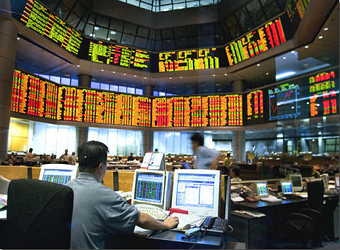Asia markets traded mostly higher on Tuesday, with some market watchers expecting the optimism around President Donald Trump’s economic policies, which have sent global stocks higher in recent weeks, to persist.
Jonathan Pain, author of the Pain Report, told CNBC’s Squawk Box Trump’s pro-growth messages were still seen as a positive for markets, which he said were being driven by ‘animal spirits.’
The term animal spirits was used by economist John Maynard Keynes to describe how human emotion drives consumer confidence.
“I still feel we’re in that kind of first derivative, reflexive euphoria,” Pain said, but he added what investors are trying to grapple is the lack of details around Trump’s proposed policies, such as tax reforms, and the President’s protectionist rhetoric.
In South Korea, the benchmark Kospi index climbed to levels not seen since July 2015, after customs data showed a jump in exports in the first 20 days of February.
Exports climbed 26.2 percent on-year in dollar terms, while imports increased 26 percent and there was a trade surplus of $2.19 billion, Reuters reported.
South Korean blue chip stocks traded mostly up, with Posco up 1.4 percent, Kepco up 0.4 percent and SK Hynix gaining two percent.
Samsung Electronics shares advanced 1.66 percent, despite the arrest of group chief Jay Y. Lee on Friday for his alleged role in a corruption scandal. Lee was taken for questioning by authorities on Saturday after a night in the Seoul detention center, and reports suggest he will likely be indicted by next week.
Ratings agencies S&P Global Ratings, Moody’s and Fitch Ratings all said the arrest was unlikely to affect the credit rating of the flagship Samsung Electronics brand.
Fitch, however, said the arrest is likely to delay strategic investment and weigh on investor sentiment, at least in the short term. The agency added the arrest posed a potential risk to the brand’s reputation.
Shares of Kakao, which is known for its messaging platform Kakao Talk, rose 4.13 percent to 88,300 Korean won after Alibaba affiliate Ant Financial said it will invest $200 million into Kakao’s mobile payments subsidiary.
Elsewhere, Japan’s Nikkei 225 gained 0.69 percent in afternoon trade as exporters saw fractional gains on the back of a relatively weaker yen.
The yen traded at 113.64 to the dollar, weakening from an earlier low of 113.06 but remained stronger than levels near 114.4 last week.
A weaker yen is usually a positive for exporters as it increases their overseas earnings when converted back to local currency.
Toyota shares rose 0.53 percent, Sony shares were up 0.48 percent and Honda rose 0.62 percent.
Toshiba shares were down 1.29 percent, retracing gains of more than 1.6 percent in morning trade after Reuters reported the troubled conglomerate wants to raise at least 1 trillion yen ($8.83 billion) from the sale of a majority stake in its NAND flash memory business. The company previously reported a $6.3 billion writedown of its U.S. nuclear unit.
Hong Kong’s Hang Seng index fell 0.16 percent in afternoon trade. Chinese mainland markets traded higher, with the Shanghai composite up 0.26 percent and the Shenzhen composite adding 0.71 percent.
HSBC announced its 2016 pre-tax profit fell 62 percent to $7.1 billion, which was well below a Reuters estimate at $14.4 billion.
The bank grappled with slowing economic growth in its core markets in Hong Kong and Britain and took one-time charges related to some of its businesses.
Hong Kong-listed HSBC shares fell 3.41 percent in the aftermath, while rival Standard Chartered slipped 0.88 percent.
Down Under, the benchmark ASX 200 bucked the upward trend to trade down 0.16 percent.
The session in Asia came after markets in the U.S. were closed on Monday for a public holiday.
“With U.S. markets closed for Presidents’ Day, it was perhaps apt that President Trump gave markets some reprieve from the combined but confused effects of Trumpflation and Donald Doubt,” analysts at Mizuho Bank said in a note.
In the currency market, the dollar index, which measures the greenback against a basket of currencies, rose moderately to 101.20 at 1:10 p.m. HK/SIN, up from an earlier low of 100.91.
Analysts at Singapore’s DBS Bank pointed out for the dollar to strengthen, the dollar index needs “the buy-in from the interest rate markets.”
The DBS analysts pointed out the dollar is also struggling against the Trump administration’s complaints accusing China, Japan and Germany of keeping their currencies undervalued.
Stephen Innes, a senior trader at OANDA, said that though the narrow trading ranges in the dollar were frustrating traders, there were still enough moving parts to keep things interesting in the currency market.
“European risks are smoldering and Fed minutes are on tap as Fed watch is creeping back into the headlines,” he said.
The Australian dollar slipped slightly against the greenback, trading at $0.7666, down from its previous close at $0.7686. Meanwhile, the euro traded at $1.0581.
Oil prices were mixed Tuesday afternoon, with global benchmark Brent down 0.11 percent to $56.12, while U.S. crude futures added 0.51 percent to $53.67.
Reuters reported top OPEC producer Saudi Arabia’s crude oil shipments fell in December to 8.014 million barrels per day (bpd) from 8.258 million bpd in November.
Source: CNBC
